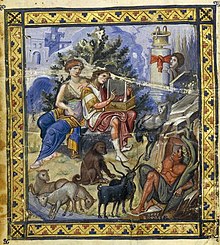
Back Psalms Afrikaans መዝሙረ ዳዊት Amharic Salmos AN سفر المزامير Arabic ܡܙܡܘܪܐ ARC سفر المزامير ARZ Məzamir Azerbaijani Зәбур Bashkir Buach der Psalmen BAR Buku Psalmen BBC

 | |||||
| Tanakh (Judaism) | |||||
|---|---|---|---|---|---|
|
|
|||||
| Old Testament (Christianity) | |||||
|
|
|||||
| Bible portal | |||||
The Book of Psalms (/sɑː(l)mz/, US also /sɔː(l)mz/;[2] Biblical Hebrew: תְּהִלִּים, romanized: Tehillīm, lit. 'praises'; Ancient Greek: Ψαλμός, romanized: Psalmós; Latin: Liber Psalmorum; Arabic: زَبُورُ, romanized: Zabūr), also known as the Psalter, is the first book of the third section of the Tanakh (Hebrew Bible) called Ketuvim ('Writings'), and a book of the Old Testament.[3]
The book is an anthology of Hebrew religious hymns. In the Jewish and Western Christian traditions, there are 150 psalms, and several more in the Eastern Christian churches.[4][5] The book is divided into five sections, each ending with a doxology, a hymn of praise. There are several types of psalms, including hymns or songs of praise, communal and individual laments, royal psalms, imprecation, and individual thanksgivings. The book also includes psalms of communal thanksgiving, wisdom, pilgrimage and other categories.
Many of the psalms contain attributions to the name of King David and other Biblical figures including Asaph, the sons of Korah, and Solomon. Davidic authorship of the Psalms is not accepted as historical fact by modern scholars, who view it as a way to link biblical writings to well-known figures; while the dating of the Psalms is “notoriously difficult,” some are considered preexilic and others postexilic.[5] The Dead Sea Scrolls suggest that the text of the later psalms (Psalms 90-150) was not fixed in the mid-1st century AD.[6][7] Septuagint scholars, including Eugene Ulrich, have argued that the Hebrew Psalter was not closed until the first century CE.[8][9]
In English, the title of the book is derived from the Greek word ψαλμοί (psalmoi), meaning 'instrumental music' and, by extension, 'the words accompanying the music'.[10] The Hebrew name of the book, Tehillim (תהילים), means 'praises', as it contains many praises and supplications to God.
- ^ Helen C. Evans; William W. Wixom, eds. (5 March 1997). The Glory of Byzantium: Art and Culture of the Middle Byzantine Era, A.D. 843-1261. Metropolitan Museum of Art. p. 86. ISBN 978-0-87099-777-8. Retrieved 5 March 2018 – via Internet Archive.
- ^ "Psalm." Longman Pronunciation Dictionary. Pearson.
- ^ Mazor 2011, p. 589.
- ^ Kselman 2007, p. 775.
- ^ a b Berlin & Brettler 2004, p. 1282.
- ^ VanderKam, James. The Dead Sea Scrolls Today. 2nd ed., Eerdmans, 2010.
- ^ Collins, John J. Introduction to the Hebrew Bible: Third Edition (2018). p. 498. Fortress Press.
- ^ Wilson, Gerald, "King, Messiah, and the Reign of God: Revisiting the Royal Psalms and the Shape of the Psalter." The Book of Psalms: Composition and Reception. p. 394. Brill. 2005.
- ^ Ulrich, Eugene (2000). Qumran Cave 4: XI: Psalms to Chronicles. Oxford University Press. ISBN 978-0198269434.
- ^ Murphy 1993, p. 626.